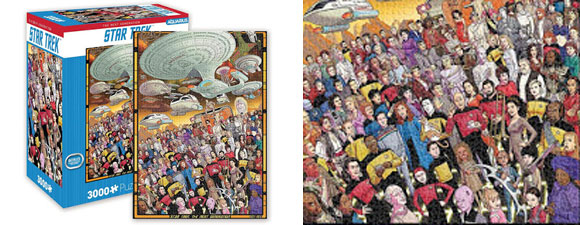Retro Review: Interface
7 min readWhile testing a new sensor for his VISOR, LaForge is shocked to discover his missing mother marooned on a nearby planet.
Plot Summary: LaForge is testing a new interface for his VISOR which allows him to link his brain with an external probe, which may be the only hope of rescuing the science vessel Raman, trapped in the atmosphere of a gas giant. While LaForge works with Crusher to adjust the sensors to a level his brain can tolerate, Picard learns from Admiral Holt that LaForge’s mother’s ship, the Hera, has disappeared. Riker volunteers to learn to control the probe so that LaForge can take some time off, but since the probe was calibrated to work with LaForge’s VISOR, he knows he may be the only hope for the crew of the Raman. On the trapped ship he finds only corpses, and the input level from the probe is so high that when he witnesses a fire, his hands are burned on the Enterprise. Crusher believes it may be too dangerous to continue, but LaForge wants to retrieve the Raman’s database so the crew will not have died in vain. Meanwhile he tells his father, a Starfleet science officer, that he won’t accept that his mother has died until they have more proof. When LaForge returns to the Raman via the probe, he sees his mother standing on the ship. She explains that she is not really there but sent a subspace signal through the warp funnel that trapped her ship, just as LaForge is not really there but using a probe to maneuver. A violent shock wave jars LaForge out of neural contact with the probe but he tells the crew that his mother is trapped below and must return to help her. Picard has trouble accepting that this might be possible, and moreover knows it will risk LaForge’s life to allow him to use the probe again, so he orders the interface deactivated. Convinced that his mother is alive, LaForge sneaks into the lab to try to find her, helped by a reluctant Data who fears that LaForge will die if he is not monitored. When Picard learns that the Raman is descending through the gas giant’s atmosphere, he realizes that LaForge has violated orders, but LaForge will not disconnect until he sees for himself that the Hera is not below him. His “mother” is actually one of several aliens who became trapped on the Raman and will die if they do not descend through the gas giant’s atmosphere. LaForge is able to save the aliens before the probe overloads and destroys his neural connections. Though angry that LaForge violated orders, Picard says that he is truly sorry LaForge did not find his mother, whose death LaForge is now willing to contemplate since he has said goodbye to her alien double.
Analysis: “Interface” ends up being a moving, memorable episode, but it’s extremely slow and talky at the start and the science never ends up making much sense. Finally we get to see LaForge’s family, which has been a serious oversight thus far – even when he was talking to Aquiel Uhnari about her sister, he didn’t talk about his own sister and his parents, all of whom are apparently Starfleet officers like himself, his father a biologist, his mother the captain of a science vessel. We’re shown in this episode that they’re an intact, close family despite the physical distance between members and the months without personal contact, but it’s a little hard to believe at this late date that LaForge has never talked about them before, even given his natural reserve, which we see when he pretends to Data that he doesn’t need to talk about his feelings about his mother’s disappearance before admitting to the android that that it’s not really true. Silva LaForge is trying to find a girlfriend for her son – possibly her own chief engineer, whom mom believes is the second-best in the fleet – and Edward LaForge’s office suggests that he may work at Starfleet Command or Starfleet Academy. I wish we got to see Geordi’s sister and more of his dad instead of too many scenes of the crew trying to help LaForge grieve. We’ve covered similar territory before with Alexander, Jeremy, Timothy and other children, so it seems both awkward and a bit unfair for Riker and Troi to be treating LaForge the same way. He has a point when he says that it’s awfully soon to give up hope, since there is no evidence the Hera was attacked or destroyed in an accident; after all, there were people who hadn’t given up on Voyager after seven years.
But we’re subjected to three different get-in-touch-with-your-feelings dialogues – first the lovely, low-key one with Data, who must ask Geordi whether he wishes to be comforted because he’s still not adept at reading human cues, then a rather condescending one with Riker in which he compares his own childhood experience of having to acknowledge that he would never know his mother with LaForge’s need to move from denial through anger to acceptance right that moment. It’s really more telling about Riker than about LaForge, and hints at a big wound that Riker’s never completely healed no matter what he claims, but this isn’t the time for it…it would make for better storytelling to get LaForge back onto the Raman and with the image of his mother much sooner. I suppose a scene with Troi playing counselor is inevitable in any episode in which an officer loses a family member, but her dialogue feels trite and a bit redundant, and it’s hard to blame LaForge for getting angry and walking out, which doesn’t make her look effective in dealing with such situations. There are already enough complications with the knowledge that the probe interface might cause brain damage or even death; the episode would have done better to play those up, which would have amped up the tension as well as suggesting more strongly that LaForge might be completely out of his mind when he sees his mother in a place that, as Picard says, it’s really impossible for her to be.
And the grieving scenes also take away any time that might have been spent at the end learning about the aliens. We’ve rarely had Star Trek stories involving gas giants, so there hasn’t been much talk about what kind of life would evolve there. These beings are clearly not only intelligent but extremely sensitive; they must comprehend family structure to be able to mimic it, and they must be curious about other beings to have stayed with the Raman long enough to become trapped when it tried to leave the atmosphere. It’s suggested that the aliens killed the Raman crew accidentally by trying to access their brains directly, something they can do with LaForge through the probe and the interface, but we don’t get a lot of evidence as to whether their manipulation might be deliberately self-serving, callous about other species; they don’t express regret either about the deaths or about their plundering of LaForge’s memories to get what they need from him. How much more interesting is that than Troi’s obvious theory about LaForge’s guilt causing him to hallucinate his mother? Are the aliens drawn to strong emotion, to negative emotions in particular, or do they believe they are doing LaForge a kindness by allowing him to see his mother at the same time they’re using his feelings to save their own lives? It’s rare for me to say this about Star Trek, but enough with the human interest, already: give us new life and new civilizations!
And give us more science, particularly the sort that impacts humans directly, like LaForge’s VISOR. This is the second time this season that we’ve seen him having impulses fed directly into his brain using VISOR technology; I guess being tortured by Lore and Data with Borg and android circuits hasn’t scared LaForge off trying to experience the full potential of the device that allows him to see. Yet I must admit that, during the scenes where he’s using the probe, it’s really nice to get to see LeVar Burton’s eyes. So much of an actor’s work involves subtle expressions that are hard to portray without eye contact, and though Burton generally does a good job with gestures and vocal inflections, we get to see how much he’s capable of emoting when a quarter of his face isn’t hidden behind the VISOR. I know that there were fans, blind and sighted people both, who disliked it when he gave up the VISOR in favor of implants that looked more like eyes, and I understand the frustration with expecting people even in the 23rd century to conform to 20th century standards concerning appearance and abilities, but speaking strictly as a fan of Burton’s, I appreciate the opportunity to see this part of his range.






